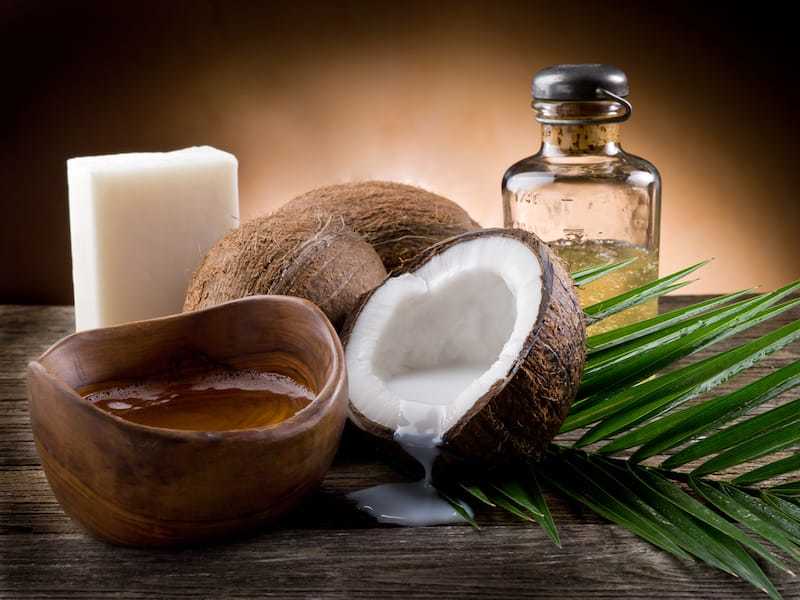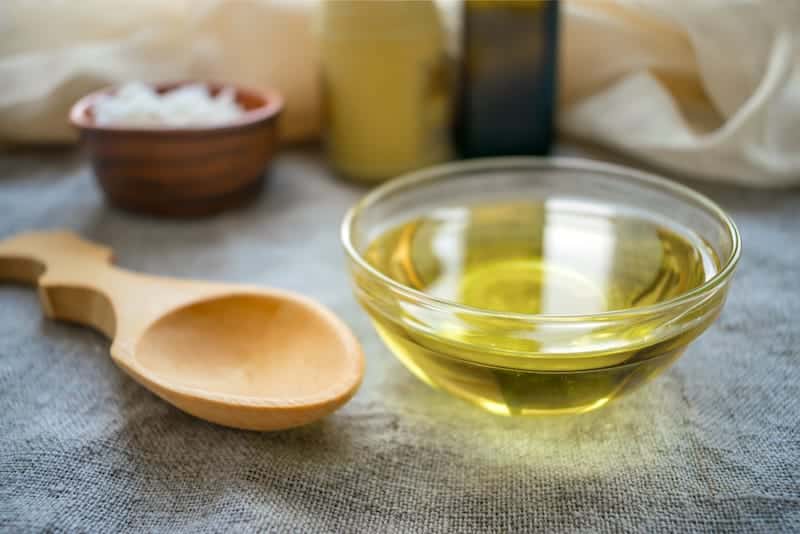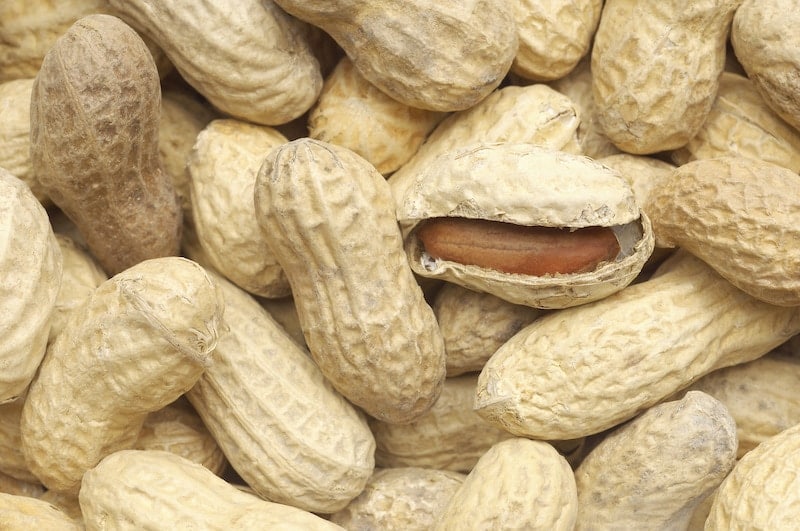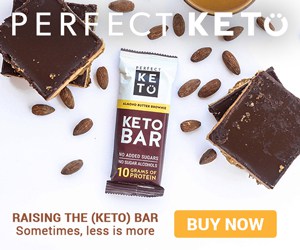The main factor that distinguishes the difference between MCT oil and coconut oil is the fatty acid composition.
Coconut oil is a mixture of both medium chain triglycerides and long chain triglycerides. In comparison, MCT oil purely consists of medium chain triglycerides. MCT oil is an artificially produced product which is a derivative of coconut oil or palm oil.
Coconut Oil

Have you ever noticed how coconut oil solidifies at cooler temperatures? That is because coconut oil is made up of both medium chain fatty acids (triglycerides) and long chain fatty acids.
The longer chain triglycerides and unsaturated fats found in coconut oil are those that solidify at cooler temperatures.
Medium chain triglycerides occur naturally in coconut oil, in the following approximate ratio:
- 42% of lauric acid (C12 – the longest of the medium chain triglycerides)
- 5% of capric acid (C10 – a medium chain triglyceride)
- 7% of caprylic acid (C8 – the most popular medium chain triglyceride)
There is a 4th medium chain triglyceride, caproic acid (C6, hexanoic acid) which is not commonly used in the making of MCT oils, supplements and powders for keto.
You will find a tiny amount of caproic acid in fractionated coconut oil.
Fractionated Coconut Oil
Coconut oil that is fractionated means that the oil has been heated beyond its melting point. Different fatty acids have different melting points. By heating the coconut oil past its melting point, then allowing it to cool, causes separation of the fatty acids.
Fractionated coconut oil for consumption has had the lauric acid removed (C12). This leaves a combination of the two most popular medium chain triglycerides caprylic acid (C8) and capric acid (C10), and sometimes a small portion of C6 (caproic acid).
Fractionated coconut oil is generally used in the beauty industry, soap making and massage oils. You can purchase food grade fractionated coconut oil such as this:
Prices pulled from the Amazon Product Advertising API on:
Product prices and availability are accurate as of the date/time indicated and are subject to change. Any price and availability information displayed on [relevant Amazon Site(s), as applicable] at the time of purchase will apply to the purchase of this product.
MCT Oil
MCT oil is made by refining raw coconut or palm oil to remove other compounds and concentrate the medium chain triglycerides found organically in the oil.
MCTs, refer to the medium-chain triglycerides also known as medium-chain fatty acids. The word medium refers to the length of the chains present in the fatty acids.
There are three different lengths of fatty acid chains: small, medium, and long. Most types of oils contain a mixture of all three types of fatty acids.
Medium-chain fatty acids are characterized by 6 to 12 chains of carbons which include:
- C6: Caproic acid
- C8: Caprylic acid
- C10: Capric acid
- C12: Lauric acid
Most MCT oils for keto contain:
- A combination of C8, C10 and C12 medium chain triglyceride oils
- A mixture of C8 and C10 medium chain triglycerides
- Solely C8 medium chain triglycerides – a premium single MCT most popular for boosting cognitive function, combining with intermittent fasting and using when following the ketogenic diet.
MCT Oil Benefits vs Coconut
It is extremely beneficial to use both MCT oil and coconut oil when following the ketogenic diet, but they each have a different use.
MCT oil is readily absorbed by the liver and converted into ketones ready for the body to use. MCT Oil provides a boost of healthy fats to your body and your brain.
It is popular with keto dieters as it helps to curb your appetite, increase clarity and mental focus and assist with naturally produced ketones.
You cannot cook with MCT oil however, and it should never be heated above 320 degrees Fahrenheit.
In comparison, the longer chain fatty acids in coconut oil allow for heating and cooking.
Both oils have a long shelf life, MCT oil remaining liquid even in cooler temperatures. Neither oil is required to be refrigerated.
Both coconut oil and MCT oil are popular additions to coffee when following the ketogenic diet.
The benefits and perks offered by coconut oil extend beyond the kitchen. Coconut oil is a great product for skin care and beauty. It is often used as a makeup remover or a moisturizer to rejuvenate dry skin.
Fractionated Coconut Oil vs MCT
As I established above, fractionated coconut oil contains a small quantity of C6 medium chain triglyceride and no C12.
Most food grade fractionated coconut oils are an approximate 60 percent / 40 percent split between C8 and C10 oils.
The fractionated coconut oil featured above contains less than half a percent of C6 MCT oil per serving.
If you are wanting to consume MCT oil as part of your keto diet, but don’t want to pay for the more expensive branded keto products, you could purchase fractionated coconut oil instead.
If you are just beginning the keto diet, or a introducing MCT oil to your diet for the first time, I don’t recommend you go purchasing 1 gallon of fractionated coconut oil. Stick with the smaller quantities and trusted keto brands until you are fully adapted to MCT oil and the ketogenic diet.
Coconut Butter vs MCT Oil
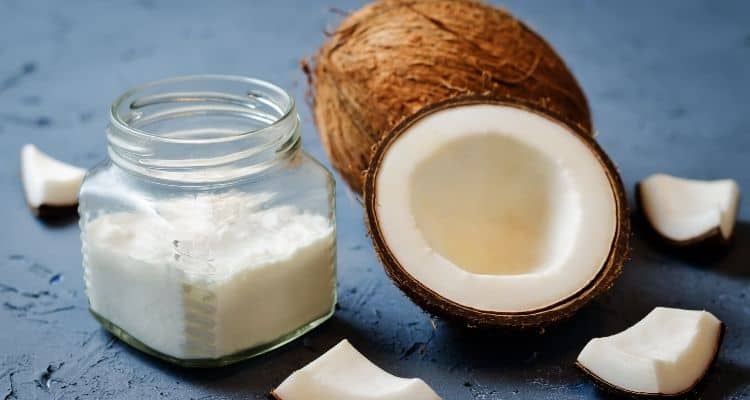
Coconut butter is made from 100 percent coconut meat which is pureed. The oil is not extracted from the meat, like it is with coconut oil.
Coconut butter therefore contains fiber from the coconut meat as well as some coconut oil. Coconut oil also contains a small amount of iron, magnesium and potassium.
Coconut butter is best used for spreads or a substitute for butter from dairy in baking or cooking. You could also use coconut butter in place of coconut oil for cooking.
MCT Oil however, is specifically designed for fast absorption by your body to give you an energy boost.
MCT Oil vs Coconut Oil for Keto
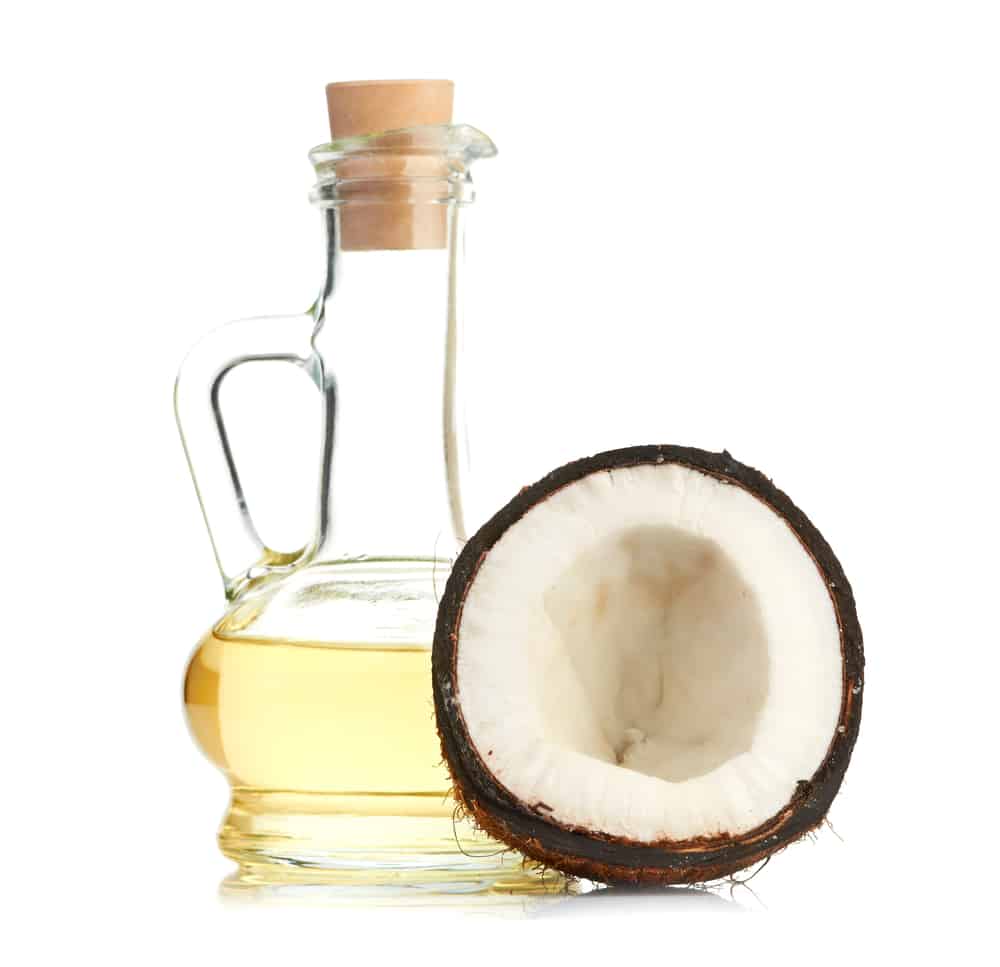
Even though MCT oil and coconut oil are not the same, a slight crossover still exists between them. To know which oil to use for keto, it is important to recall the basic differences between them.
For starters, MCT oil contains the purest forms of medium-chain triglycerides that get transferred to the liver as soon as they enter your body. MCTs are considered an ideal source to get instant energy for both the brain and the body.
Coconut oil is also a rich source of MCTs but also contains long-chain triglycerides. These triglycerides take longer for the body to digest. One of the MCTs, lauric acid, is found in abundance in coconut oil.
If you are looking for a quick energy boost for exercise, coconut oil is not the ideal option to choose. With large amounts of lauric acid and long-chain fatty acids, it may take this oil a long time to induce ketosis in your body.
Many experts suggest using coconut oil after completing a workout. Before beginning a workout, your body requires instant energy which is better supplied by MCT oil.
MCT oil is also a preferred choice for people following a keto diet mainly because it triggers ketosis at a faster rate than coconut oil.
Moreover, it is odorless and does not change the taste of your meals when added to foods and beverages.
You can easily add it to your coffee, desserts, salads and more. Just don’t cook with MCT oil.
You may come across evidence that supports the use of lauric acid (C12) as the body absorbs it more rapidly than the long chain fatty acids. As longer chain fatty acids consist of 14 to 24 carbon chains, this would be true. Naturally, the shorter the chain of fatty acid, the easier it is for the body to process.
So, when thinking about the three most common medium chain fatty acids – C8, C10 and C12, surely C8 and C10 (the two most common found in MCT oil) will be the better choice for rapid absorption by the body?
In short, when following a ketogenic diet, it is helpful to have both MCT and Coconut oils in your cupboard. Use coconut oil for cooking and high temperature uses, use MCT oil for coffee, smoothies, shakes and salads.

Related Questions
How do I use MCT Oil?
Because MCT oil is odorless and flavorless, you can incorporate it into your daily meal plans. You can add it in coffee, smoothies, or shakes, drizzle it on your salad at lunch, or coat your fish with it at dinner. If you like, you can also have a spoonful of it on its own.
Related Reading
Can I use MCT oil in place of coconut oil in cooking and baking?
While you can easily use coconut oil to cook or bake, this may not be possible with MCT oil. This is because MCT oil is a refined oil with a relatively low smoking point.
You may not be able to use it in all dishes, but it is safe to use in low-heat recipes such as marinades, salad dressings or low temperature baking. You can also add it to smoothies or coffee which require no heating. Remember that this oil will not add any additional flavor to your food.
Are coconut oil and MCT oil stored the same way?
Yes, both coconut oil and MCT oil are stored the same way. Keep them in a cool, dry place where there is no direct sunlight. Both types of oil do not require any refrigeration. Read our post Can MCT Oil Go Bad? for further information on storing and using MCT oil.

